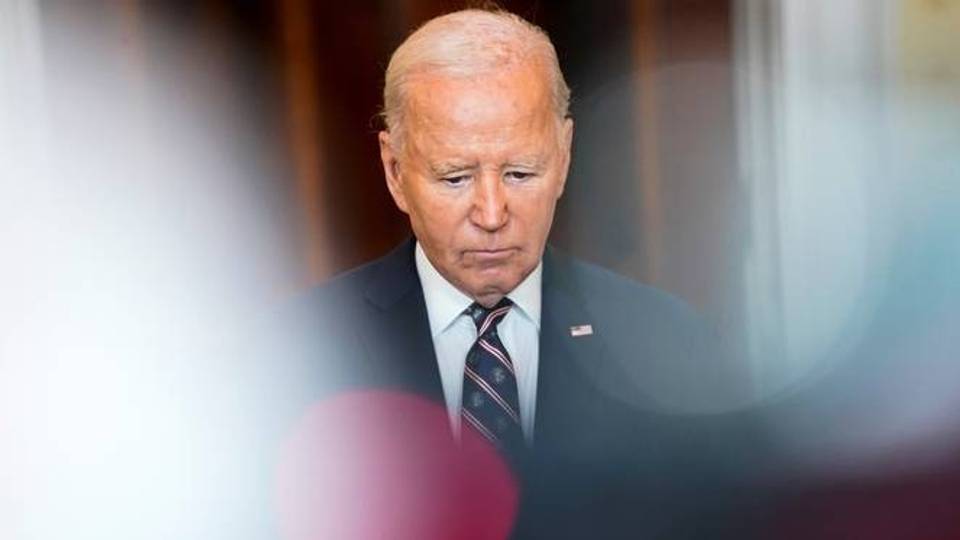Sport
Dollar
38,1588
0.3 %Euro
43,6101
1.61 %Gram Gold
3.958,7400
2.25 %Quarter Gold
6.529,2600
2.67 %Silver
39,4700
3.6 %US President Joe Biden's leadership has faltered over the past year during Israel's war on Gaza. As tensions with Iran grow, can his administration pull the warring parties back from the brink?

By Jasmine El-Gamal
As we mark the one-year anniversary of the October 7 Hamas-led attacks on Israel and the devastating Israeli war in Gaza, the region remains in turmoil. Israel's war on Gaza and its expanding attacks in Lebanon have claimed tens of thousands of lives, displaced over 2 million people, and rendered the prospect of peace in the Middle East, for now, a distant fantasy.
With Israel poised to strike Iran in the latest round of tit-for-tat attacks between the two countries, those living in the region fear an uncontrollable expansion of the war.
At such a critical moment, questions around the role of the United States loom large. Having failed thus far to significantly influence Israel's decisions, will US President Joe Biden now turn up the pressure on Israeli Prime Minister Benjamin Netanyahu to prevent a wider war? The answer remains uncertain.
Iran has long nurtured its proxies in Lebanon and in the region with the aim of weakening Israel. On October 8 of last year, that strategy kicked into gear when Hezbollah, arguably the strongest and most capable of Iran's proxies, launched rocket barrages into northern Israel.
The move set off a year-long exchange of attacks between Hezbollah and Israel, first displacing the Israeli population in northern Israel and now the population of southern Lebanon.
Israel has recently shifted its focus from Gaza to its northern border when the military dramatically escalated the conflict by assassinating Hezbollah's Secretary General Hassan Nasrallah in Lebanon.
With both Hamas and Hezbollah severely weakened, Israel now sees an opportunity to strike a significant blow to Iran itself.
Impotent US
In recent weeks, Netanyahu and other leading Israeli figures, including former Prime Minister Naftali Bennet, have openly contemplated or advocated striking Iran's nuclear facilities.
Such a move would undoubtedly plunge the region into deeper chaos and could provoke a much larger, multi-front war, one that would bring in the US in a manner yet unseen.
Against the backdrop of impending war, a renewed American effort to lower tensions in the region is critical.
However, rather than summoning its diplomatic might to do so, the Biden administration appears impotent, with American officials leaking to the press that the administration has grown "increasingly distrustful" of what the Netanyahu government says about its military and diplomatic plans in the region.
Biden could take decisive action by making clear to Israel that the US would not get involved should Netanyahu choose to strike Iranian nuclear sites. This could go some way in tempering Israel's plans, but there is no public indication that Biden is considering such an option.
The US, Israel's closest ally, has been deeply involved in diplomatic efforts to manage the fallout from the war on Gaza, but official statements to that effect ring hollow when compared with actions.
While Biden's administration has reportedly been urging Israel to avoid escalating its war in Gaza and cross-border conflict with Hezbollah to a point of no return, the president himself has publicly continued to reiterate Israel's right to defend itself and underscored that the US would continue to come to Israel's defence if necessary.
In case of a wider war between Israel and Iran, US involvement would also not be confined to Israel's defence. That's because retaliatory strikes by Iran against Israel could also target US forces stationed in the region.
The Biden administration has also provided Israel with military aid throughout the brutal war- nearly $18 billion in the past year - and except for one instance where Biden temporarily paused one weapons shipment to Israel in May, he has resisted calls to issue any further pauses or a larger arms embargo.
Biden's unwillingness to use military assistance as leverage not only stems from his personal commitment to Israel's security– during his remarks on the one-year anniversary of October 7, he stated that he was the first American president to visit Israel in a time of war– but also domestic pressure in an extremely consequential election year.
(Biden) likely does not want to invite further criticism or risk syphoning away votes from Vice President Kamala Harris due to his decisions.
The president suffered significant blowback for pausing that weapons shipment in May. He likely does not want to invite further criticism or risk syphoning away votes from Vice President Kamala Harris due to his decisions.
Endless conflict
US efforts at a ceasefire in both Gaza and Lebanon have thus far been futile, and with the presidential elections less than 30 days away, many in the region are concerned that the White House's commitment to ceasefire negotiations is merely perfunctory.
Meanwhile, Israel's military objectives, particularly concerning Hezbollah's military infrastructure and the larger threat from Iran, appear far from complete. As Netanyahu recently stated, "we won't rest until our citizens can return safely to their homes," and "we will continue degrading Hezbollah until all our objectives are met."
Yet Netanyahu's insistence on continuing down the route of military action begs a larger question: is there an Israeli strategy for peace, or are Israel's self-proclaimed tactical successes against Hamas and Hezbollah simply paving the way towards endless conflict?
The Biden administration has thus far been unable to answer that question, and in continually assigning responsibility for the ongoing conflicts to one side, that is, Iran and its proxies, it does not appear willing to hold Israel accountable for its own escalatory moves.
And while no US president since George W. Bush has sought a war in the region, some in the Washington national security establishment as well as Congress, such as South Carolina's Republican Senator Lindsay Graham, have long advocated for strikes on Iran's nuclear program.
In the absence of US leadership in the region, coupled with American preoccupation with the upcoming elections, it appears that a likely expansion of the conflict is inevitable.
Crossroads
To be clear, there is still time to prevent an all-out war between Israel and Iran and its proxies.
Israeli Defense Minister Yoav Gallant is set to visit Washington this week, after having told US Defense Secretary Lloyd Austin last Sunday that Israel has not yet made a final decision about the scope and timing of its retaliation against Iran.
One hopes the Biden administration will use this critical opportunity to exert more pressure on Israel than it has thus far, recognising that a conflict between Israel and Iran could quickly spiral out of control and even push Iran to attempt to weaponise its nuclear program.
As we reflect on the past year, it is clear that the region is at a dangerous crossroads. The human cost has been staggering, with tens of thousands dead, millions displaced, and the spectre of a larger regional war looming.
Without decisive diplomatic intervention, the Middle East risks sliding further into chaos, a prospect that would have dire consequences not only for those living in the region, but for global security as a whole.
The author, Jasmine El-Gamal is a national security analyst and former Middle East advisor at the Pentagon. She is the founder and CEO of Mindwork Strategies, LTD, a consulting firm with a mission to help organisations craft empathy-based, culturally driven approaches to foreign policy, communications and workplace mental health.
Disclaimer: The views expressed by the author do not necessarily reflect the opinions, viewpoints and editorial policies of TRT Afrika.
➤ Click here to follow our WhatsApp channel for more stories.
Comments
No comments Yet




















Comment